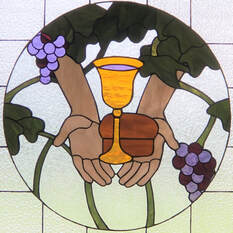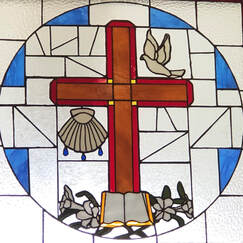We Believe, Teach, and Confess the Sacraments
On this page we will examine the meaning of the word "sacrament," and those rites which are recognized by the
Lutheran Church-Missouri Synod as sacraments.
Lutheran Church-Missouri Synod as sacraments.
What is a Sacrament?
The word sacrament comes from the Latin "sacramentum" which has several meanings, among them:
1) A secret; 2) A gospel revelation; 3) A sacred act; 4) A rite of the church; 5) and the office of the ministry.
1) A secret; 2) A gospel revelation; 3) A sacred act; 4) A rite of the church; 5) and the office of the ministry.
Historically. The Lutheran Church has defined a sacrament as a sacred act;
|
|
What is The Sacrament of the Altar?

It is the true body and blood of our Lord Jesus Christ in, with, and under the visible
elements of bread and wine, that was instituted by Christ Himself, as written the gospels
of Matthew 26:26-28, Mark 14:22-24, Luke 22:19-21 and the writing of St. Paul in
1 Corthians 1:11; 23-34.
elements of bread and wine, that was instituted by Christ Himself, as written the gospels
of Matthew 26:26-28, Mark 14:22-24, Luke 22:19-21 and the writing of St. Paul in
1 Corthians 1:11; 23-34.
We believe, teach and confess that:
- Jesus is present in the Sacrament;
- The visible elements of bread and wine remain in the Sacrament with Christ's body and blood;
- All who commune should receive both parts of the Sacrament, since Christ said, "Take eat....Take drink..."
- The body and blood are the one perfect sacrifice offered once and for all on the cross and received now with
all the blessings and benefits which that sacrifice has won for us; - By His words, "This do in remembrance of Me" we celebrate His Sacrament in the church as a living proclamation and distribution of His saving death and all its blessings;
- The blessings of the Sacrament are forgiveness of sins, life, salvation;
- Forgiveness of sins, life and salvation are received not just through bodily eating and drinking, but the words of Christ together with His body and blood under the bread and wine are the way blessings are received;
- Anyone who does not believe the words "Given and shed for you for the forgiveness of sins" is unworthy and unprepared to receive the Sacrament, since the words "for you" require all hearts to believe;
- We examine ourselves before the Sacrament to determine if we are sorry for our sins, believe in Jesus as Savior and His words in the Sacrament, and if, with the help of the Holy Spirit, we will change our sinful lives.
- Those of a different confession of faith, those unable to examine themselves, such as infants, people who have not received proper instructions, and the ungodly or unrepentant, should not commune. The Sacrament of the Alter may also be referred to as the "Eucharist,"The Lord's Supper,"The Lord's Table," "Holy Communion," "The Breaking of Bread."
What is the Sacrament of Holy Baptism?"It is nothing else than a divine water; not that the water in itself is nobler than other water, but that God's Word and commandment are added to it "Large Catechism IV14". Baptism means to apply water by immersing, washing or pouring. What is so special about the water of Baptism?
|
We believe, teach, and confess that:
- The Sacrament of Holy Baptism is not just plain water, but the water included in God's command and combined with God's word. Christ says, "Therefore go and make disciples of all nations, baptizing them in the name of the Father and of the Son and of the Holy Spirit." (Matt.:28-29)
- Jesus Christ Himself instituted Baptism, commanding His church to baptize all nations (Matt.:28-29-20)
- Baptizing in the Trinity, Father, Son, and Holy Spirit, receives us into communion fellowship with Christ;
- Holy Baptism is not a water-only or a Spirit-only baptism, but a water-and-Spirit Baptism.
- Water alone does not save. But the word of God in and with the water does this, along with faith which trusts the word of God in the water. For without God's word the water is plain water and not Baptism.
- All people "all nations" are to be baptized, that is; all people, young and old;
- Those who can receive instruction are to be baptized after instruction in the main articles of Christian faith;
- Babies are to be baptized because they are included in the words, "all nations"; because Jesus invites the little children to come unto Him (Luke 18:15-17); and as sinners, babies need what Baptism offers (John 3:5-6, Eph. 2:3)
- Baptism works forgiveness of sins, rescues from death and the devil, and gives eternal salvation to all who believe in the words and promises God declares;
- Jesus says, "Whoever believes and is baptized will be saved, but whoever does not believe will be condemned." (Mk: 16-16);
- Christ won forgiveness and salvation for us with His perfect life, suffering and resurrection; distributing the same forgiveness in Baptism, a means of grace, and giving these blessings to all who believe in God's promise;
- It is only unbelief that condemns. Faith cannot exist in the heart of person who rejects Baptism against their better knowledge. But those who believe the Gospel, yet die before they are baptized are not condemned.
- God's words of institution puts the blessings of forgiveness of sins, life and salvation into Baptism. Faith, which trusts this word of God in the water, takes the blessings out and makes them our own.
- In Baptism, the Holy Spirit works faith and creates in us new spiritual life with the power to overcome sin.
- In Baptism the Old Adam-the corrupt nature that we inherit because of Adam's fall into sin-is drowned by daily contrition (sorrow for sins) and repentance (faith), which helps us to overcome sinful desires.
What about Confession and Absolution?
Absolution meets the first and third criteria listed at the beginning of this page, but not the second (since unlike Baptism and the Lords Supper, there is no "visible element" tied to absolution). The Lutheran Confessions, however, do at times refer to absolution as a sacrament in the broader sense of the term.
Depending on how broadly the word sacrament is defined, a number of "holy things" or "holy acts" could be called "sacraments". But according to the (three-part) Lutheran definition given at the start of this page, only two qualify: Baptism and the Lord's Supper.
Depending on how broadly the word sacrament is defined, a number of "holy things" or "holy acts" could be called "sacraments". But according to the (three-part) Lutheran definition given at the start of this page, only two qualify: Baptism and the Lord's Supper.
What is Confession and Absolution?
Confession and Absolution are two parts of what is referred to as The Office of the Keys, which is that special authority Christ gives to His church on earth to forgive the sins of repentant sins, but to withhold forgiveness from the unrepentant as long as they do not repent (Matt. 18:18). It is called the Office of the Keys in that the authority works like a key; to open heaven by forgiving sins, or to close heaven by not forgiving them.
St. John writes in Chapter twenty: The Lord Jesus breathed on His disciples and said, "Receive the Holy Spirit. If you forgive anyone his sins, they are forgiven; if you do not forgive them, that are not forgiven." (John 20:22-23)
St. John writes in Chapter twenty: The Lord Jesus breathed on His disciples and said, "Receive the Holy Spirit. If you forgive anyone his sins, they are forgiven; if you do not forgive them, that are not forgiven." (John 20:22-23)
We believe, teach, and confess that:
- First, we confess our sins; and second, we receive absolution (forgiveness) from the pastor as from God Himself, without doubt that by it our sins are forgiven before God in heaven;
- Those who repent and ask for forgiveness are to be forgiven, and that only repentant believers receive forgiveness in absolution;
- Unrepentant sinners, that is, those who are not sorry for their sins and do not believe in Jesus Christ, are not to be forgiven as long they do not repent.
- The Congregation by the command of Christ calls pastor to carry out duties of the Office of the Keys publicly in Christ's name and on behalf of the congregation, The pastoral office is a divine institution.
- When we sincerely repent of our sins and believe in the promise of God that our sins are forgiven, good works, which are the fruits of the repentance, will follow. (Augsburg Confession XII 6). (Matt. 3:8)
Additional Information on the Sacraments
For more detailed information or to learn more about the Sacraments of the Lutheran Church-Missouri Synod, the following resources (some of which have been used in the preparation of this page) are available:
- Luther's Small Catechism with explanation
- Luther's Large Catechism
- The Book of Concord
- (The Confessions fo the Evangelical Lutheran Church)
- Lutheran Cyclopedia
- The Augsburg Confession
These and other texts are available at the church. Please see the Pastor or the Church Office Assistant to check out any of these text.
